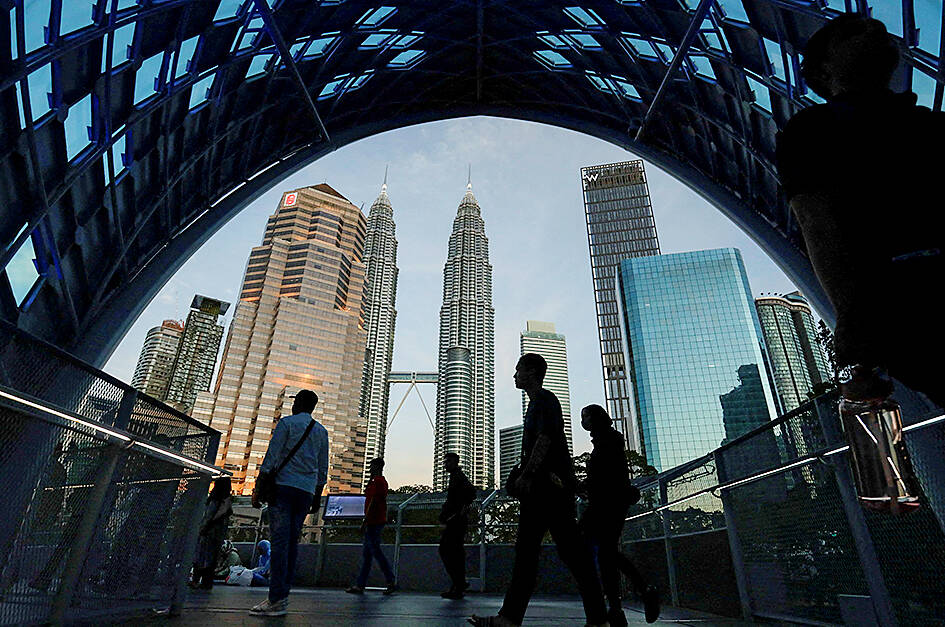The 1975 frontman Matty Healy’s recent appearance at a festival in Kuala Lumpur — where he criticized Malaysia’s homophobic laws and kissed a male bandmate on stage — has strongly angered conservatives in the country.
Members of the LGBTQ+ community have also expressed unease over his actions, fearing that the episode risks further exacerbating the hostilities they face.
“He gets to fly out of the country and not face the consequences, while our people have to face the brunt of what just happened,” said drag performer Carmen Rose, who described the speech as self-serving, adding that it risked undoing the work of activists.

Photo: AP
The British pop-rock singer was headlining the Good Vibes festival when he criticized the country’s homophobic laws in a profanity-laden speech . He was holding what appeared to be a wine bottle and spat on the stage as he spoke.
He said: “Unfortunately you don’t get a set of loads of uplifting songs because I’m fucking furious. And that’s not fair on you, because you’re not representative of your government. Because you’re young people, and I’m sure a lot of you are gay and progressive and cool.”
The comment was met with some cheers from the audience.

Photo : Reuters
Healy then kissed the bass player Ross MacDonald as they played the song I Like America & America Likes Me. About 30 minutes later the band walked off stage, with Healy announcing they were now banned.
The following day, organizers of the festival announced that the entire weekend event had been canceled. The government has also said it will tighten entry requirements for foreign artists to perform in Malaysia, according to local media.
FREEDOM OF SPEECH
Dhia Rezki Rohaizad, the deputy president of Jejaka, a social support group for gay, bisexual and queer men in Malaysia, criticized the government’s handling of the situation, citing Healy’s right to freedom of expression.
But he added that Healy’s speech was not how many activists in the country would have wanted to highlight the issue. “We’ve been doing a lot of work on the ground, community organizing, and having stakeholder meetings with local government agencies,” he said. “Doing it at this scale, with a lot of people who are not aware of the discussions going around with regards to queer activism, that is what is harmful.”
Malaysia’s federal penal code, first introduced during British colonial rule, punishes oral and anal sex with up to 20 years in prison.
Each state and the federal territories of Kuala Lumpur and Putrajaya also have sharia codes that generally criminalize gay sex and gender nonconformity.
Activists have warned of increased intolerance over recent years, citing in particular a raid on an LGBTQ+ Halloween party in Kuala Lumpur last year, when 20 people were arrested.
“For people who live in Kuala Lumpur, the raid was a very scary night and I think that since then a lot of us do live in fear,” said Mikhail Hanafi, a member of the LGBTQ+ community. “In a lot of other places in the world, queer nightlife is one of the places where at least a subset of queer people can feel safe and a sense of community.”
MORE HARM THAN GOOD?
This was no longer the case in Malaysia, Hanafi said, adding that when the lights came on in a club at the end of the night, some friends immediately felt a sense of panic, fearing that this was the sign of another police raid.
There was value in foreign performers speaking out, said Hanafi. But he added: “They need to be mindful of how they speak. They need to speak to the community beforehand.”
Activists are especially concerned that Healy’s comments come just weeks before state elections. Campaigning often coincided with a rise in hate speech, said Thilaga Sulathireh, a founder of the group Justice for Sisters, which advocates for LGBTQ+ rights.
On Monday, the national human rights commission of Malaysia said that while it “advocates equality for all and freedom of expression, it is important to stress that these rights must be practiced responsibly and within any restrictions imposed by local laws and cultural considerations.”
Sulathireh said the statement illustrated why LGBTQ+ communities felt nervous. “It is really a testament to the protection that LGBT people have in Malaysia. Of course, folks are going to be concerned — if anything were to happen to them they feel completely unprotected.”
Carmen Rose says she is not able to advertise performances in Kuala Lumpur, due to pressure on the community. “Any foreign artist who comes here and who wants to advocate for us, they need to understand how to go about it,” she said. “What works in the west may not work here. They may actually do more harm than good.”

June 23 to June 29 After capturing the walled city of Hsinchu on June 22, 1895, the Japanese hoped to quickly push south and seize control of Taiwan’s entire west coast — but their advance was stalled for more than a month. Not only did local Hakka fighters continue to cause them headaches, resistance forces even attempted to retake the city three times. “We had planned to occupy Anping (Tainan) and Takao (Kaohsiung) as soon as possible, but ever since we took Hsinchu, nearby bandits proclaiming to be ‘righteous people’ (義民) have been destroying train tracks and electrical cables, and gathering in villages

Dr. Y. Tony Yang, Associate Dean of Health Policy and Population Science at George Washington University, argued last week in a piece for the Taipei Times about former president Ma Ying-jeou (馬英九) leading a student delegation to the People’s Republic of China (PRC) that, “The real question is not whether Ma’s visit helps or hurts Taiwan — it is why Taiwan lacks a sophisticated, multi-track approach to one of the most complex geopolitical relationships in the world” (“Ma’s Visit, DPP’s Blind Spot,” June 18, page 8). Yang contends that the Democratic Progressive Party (DPP) has a blind spot: “By treating any

Swooping low over the banks of a Nile River tributary, an aid flight run by retired American military officers released a stream of food-stuffed sacks over a town emptied by fighting in South Sudan, a country wracked by conflict. Last week’s air drop was the latest in a controversial development — private contracting firms led by former US intelligence officers and military veterans delivering aid to some of the world’s deadliest conflict zones, in operations organized with governments that are combatants in the conflicts. The moves are roiling the global aid community, which warns of a more militarized, politicized and profit-seeking trend

This year will go down in the history books. Taiwan faces enormous turmoil and uncertainty in the coming months. Which political parties are in a good position to handle big changes? All of the main parties are beset with challenges. Taking stock, this column examined the Taiwan People’s Party (TPP) (“Huang Kuo-chang’s choking the life out of the TPP,” May 28, page 12), the Democratic Progressive Party (DPP) (“Challenges amid choppy waters for the DPP,” June 14, page 12) and the Chinese Nationalist Party (KMT) (“KMT struggles to seize opportunities as ‘interesting times’ loom,” June 20, page 11). Times like these can